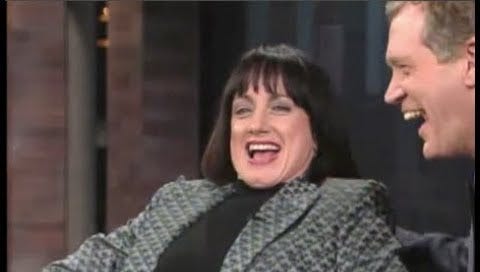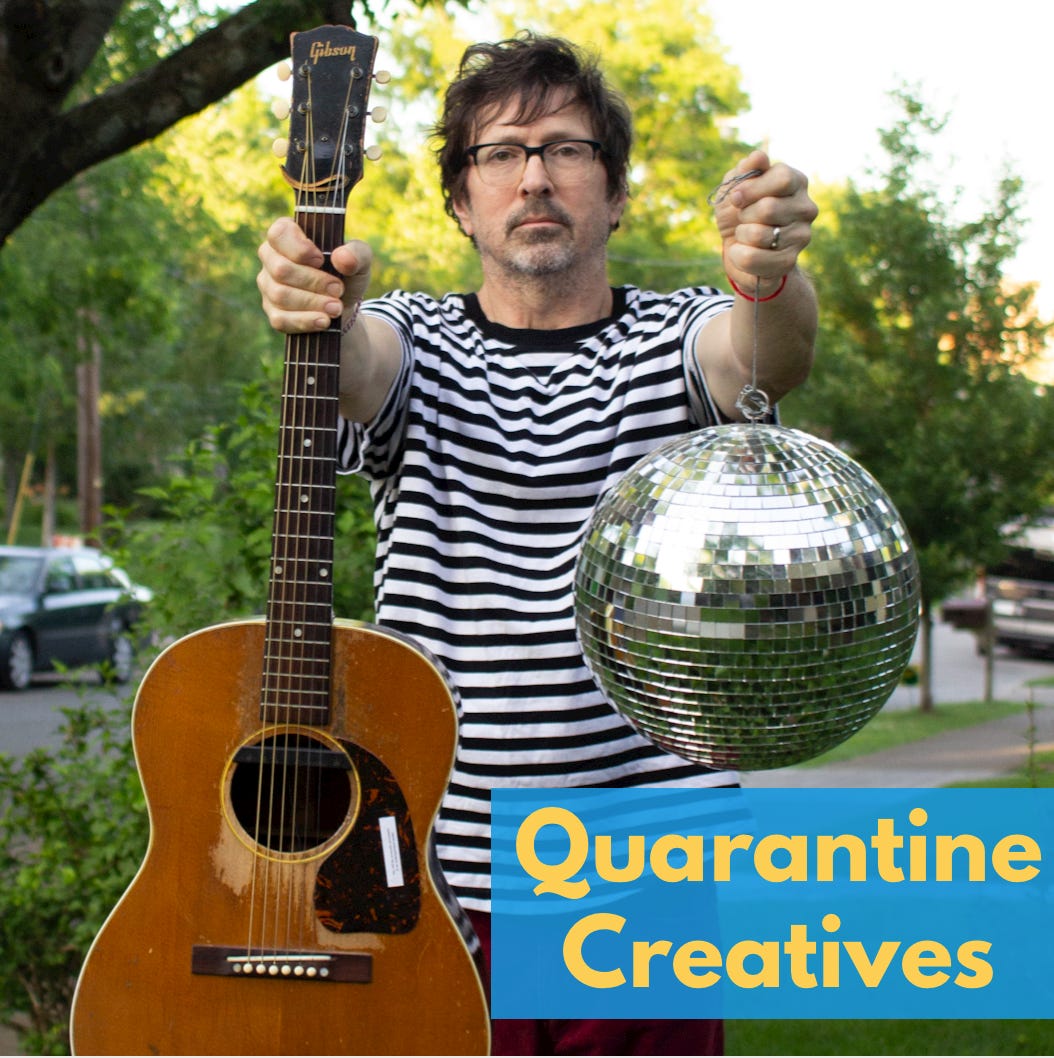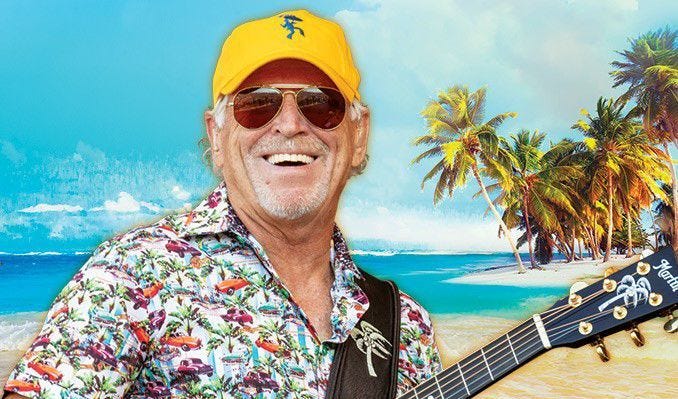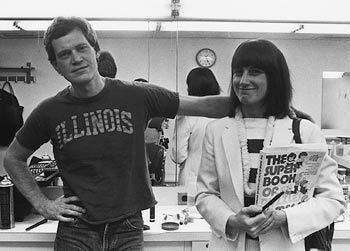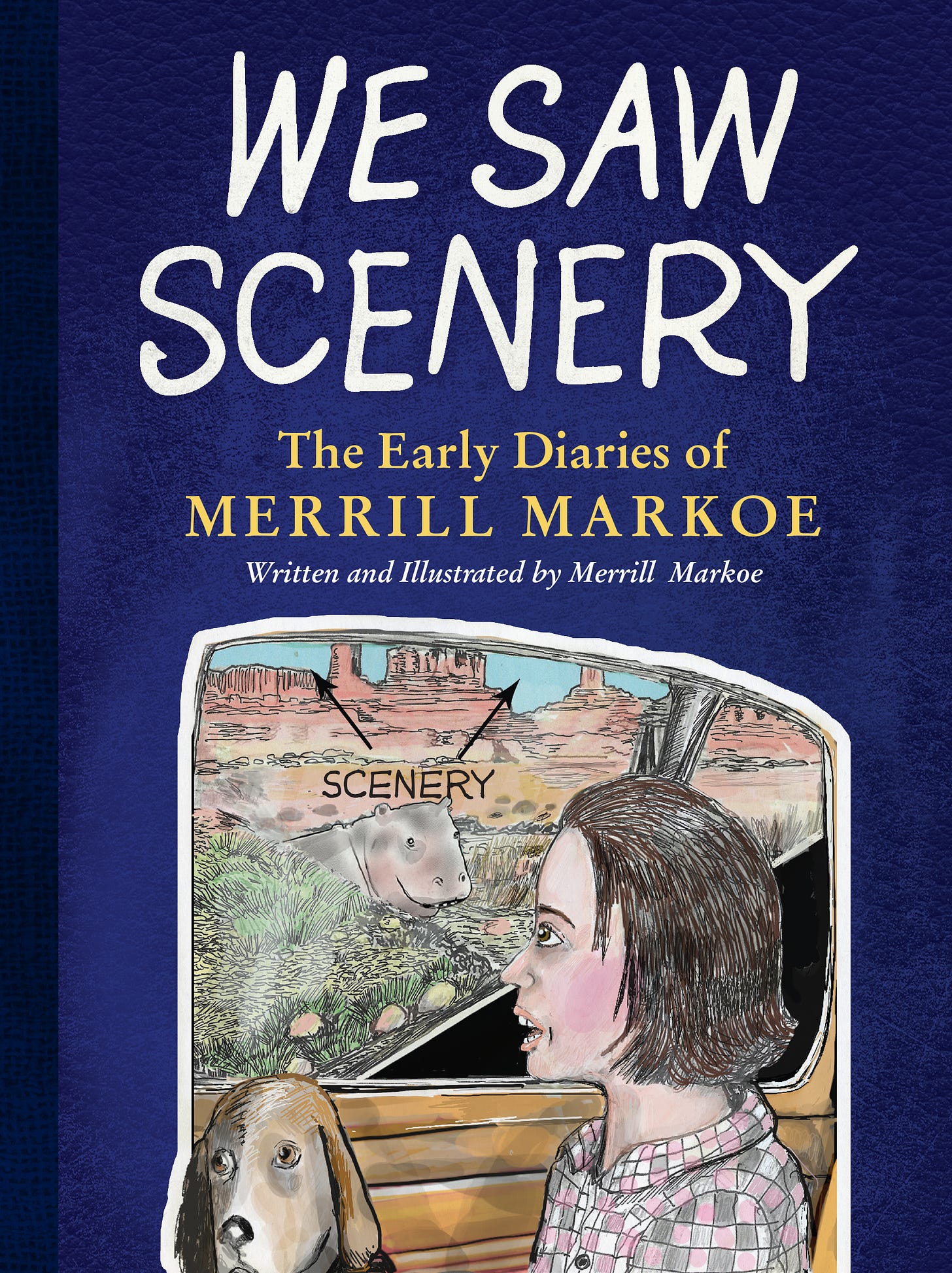Hello everybody and welcome to the first edition of the Quarantine Creatives newsletter, a companion to my podcast of the same name. This newsletter will be a space for recapping some of the conversations of the past week on Quarantine Creatives, plus supplementing the show by sharing additional material that I came across in my research, and my general musings on the week and the world. I am planning to release a newsletter every Sunday morning as a little meditative way to start your week and a companion to your coffee or tea. And this week, perhaps it will help with that Halloween/Daylight Savings Hangover.
But First, A Little Intro…
As the first issue, I thought this would be a good time to get you caught up on my journey into podcasting and now newslettering (that’s a verb, right?) This edition may be a little longer than others going forward, but it’s kind of like a first date where we have to get to know each other a little better.
As you may know, I spent the last 15 years as a TV producer and director at This Old House Productions. I had an amazing run, getting to visit all 50 states and even a few foreign countries, bringing Ask This Old House its first ever Emmy Award in 2019, and being called a “smart, young, fresh-faced producer” by The Washington Post. Yes, that really happened. It was strange, but flattering.
But my world changed on March 12, when I was called in to my boss’s office and was met by our Human Resources representative. Yep, it was that meeting. Of course, the timing for a layoff couldn’t be worse, as within days, the whole world seemed to be shutting down because of COVID-19 and the once booming TV/film industry in Boston came to a grinding halt, as it did in every market.
As the pandemic dragged on, I began to contemplate a meaningful contribution that I could make whilst cooped up in my house and unable to get out with a camera and make video, which had been my outlet since I was an early teenager. I had been a fan of podcasts for a long time and had several ideas swirling about how best to use that medium to tell new stories.
I felt alone and scared during that time, and I also thought I was the only person out of work because of the pandemic, despite what the Department of Labor statistics told me. But the more I talked to friends and colleagues, the more it became clear that our whole industry was dealing with seismic shifts. I felt like having intimate conversations with other industry insiders might be valuable, for me, for other creatives, and for whatever audience I could attract. The show launched in May and has been going strong ever since.
As the weeks of shutdowns have turned to months, and our concepts of work, home, success, safety, health, and everything else are being redefined, it seems like there are even broader conversations to be had beyond just what was happening in TV or movies. I still use entertainment and media as an entry point, but conversations have started to also include issues of race, gender, spirituality, and other topics that I don’t always feel comfortable wading into but that I’m always grateful for after I do.
After interviewing Amy Traverso from Yankee Magazine recently, she told me that she would be interested in hearing me sum up some of the wisdom I have gained from doing this podcast for 4 dozen shows now. I’m not sure that I ever will have enough time to fully stop and reflect on all of these amazing conversations, but perhaps by starting to write down some ideas, they will be documented in some form.
Episode 48: Will Kimbrough
I love talking with musicians. I feel a connection to what they do, despite their chosen career path sometimes feeling like a completely foreign language to me. In the intro to Monday’s show, I discussed my own musical ambitions, and it’s a story that is probably familiar to many. As a middle school student (I don’t remember for sure if this was seventh or eighth grade), I was desperate for the attention of my female classmates, but unsure how best to get them to notice me. Knowing that girls loved rock stars (or at least Ann-Margret loved Conrad Birdie in Bye Bye Birdie), it seemed like becoming a guitar player was the key to their hearts.
I took private lessons with an old hippie with a long white beard that spent our sessions blowing smoke in my face (literally) from his mini cigars that he smoked in our teeny practice room. Needless to say, my rock star days were numbered, although I did play guitar (poorly) in my middle school jazz band for a few months. The girls did not flock to me, though that may have more to do with my 1990s mullet.
Will Kimbrough was bit by the same bug around the same age, although he discovered how to turn it into a lucrative career. He talked about listening to Beatles records as a kid (the red and blue greatest hits albums mostly), but really being overcome in 1975 with the albums Kiss Alive and Bruce Springsteen’s Born to Run. Will even begged his parents to see Bruce live at a small venue in Mobile, Alabama, before The E Street Band was selling out stadiums. That was a defining moment.
When the pandemic hit, Will was touring in Australia. His first festival show had already been cancelled because of the wildfires, but he was able to play a few shows before making the call to head back to the US in early March. He spent his spring in quarantine in Nashville with his wife and his youngest daughter, who was home from college because of the pandemic.
In his home studio, Will began writing and recording songs for what would become a new album Spring Break. It was a strange change after a life of touring 200+ days per year, but he embraced it. “This is the most I’ve been home in a stretch since 1994, so I hate it, and I love being at home.” In the album, he reflects on life during the pandemic and in the world today. He has a song about the death of John Prine to COVID-19 near the beginning of the shut down.
One of the songs that really struck me was “My Right Wing Friend,” which describes a long term friendship that’s based on shared experiences like camping with your children, even if your friend is your political opposite. In these polarizing times, I found the message of that song very poignant, especially because it recognizes our shared similarities instead of our perceived differences, which seem to only be amplified by politicians, the media, and our social media echo chambers.
This brought up a discussion about the strangeness of this political moment and the need to take sides. Will described some of his experience in talking about politics with old friends:
“I remember having people sort of give me this farewell on Facebook. ‘Well, I guess since we’re not on the same page we can’t really talk anymore.’ To say we’re not on the same page, well we’re in the same solar system. We’re on the same continent. We have so much more in common.”
Will also described his work with Songwriting with Soldiers, a group that primarily helps combat veterans with PTSD process their own feelings through music. The soldier teams up with a songwriter and shares his or her experience. Then a songwriter like Will helps put those words and feelings to music. It’s therapeutic for all involved and really speaks to the power of art and music, especially in this moment of isolation.
At this point, I have a confession to make- I am a closet Parrothead. I haven’t actually been to a Jimmy Buffett show, but I have enjoyed his music for a long time, and it turns out that Will has shared a 17 year collaboration with Mr. Margaritaville, writing songs and playing on several of his albums.
Will let me in on some of the secrets of writing for Jimmy.
“One thing I’ve learned is to not try to out Jimmy Buffett Jimmy Buffett. I’m not going to suggest we say ‘toes in the sand’ or ‘pour me another tequila.’ I’m gonna let him decide how much of that he wants to put in.”
Will often will send a short demo recording from his phone when he has an idea. The song may percolate for a few months while Jimmy is busy with other ventures, but then when it’s time to record, the song idea will come back. But the flow of ideas is also bidirectional:
“He sent me a PDF one day. So I opened it up and it was literally like some kind of iPad PDF that had drawings and pictures and lyrics. But not a whole song of lyrics. And different choices of how the lyrics might possibly go. It was a storyboard. And he said ‘I want to write this song, but I’m busy doing this this week, so can you get started on this and send it to me and we’ll work on it?’ So I just took it and I just said ‘I’m gonna write a song and send it to him, and he can change it all he wants, or not use it.’”
Will also had some incredible insights about being a collaborative team player and getting along with everybody. I really enjoyed getting to know him and how he seemed open to conversation with everybody, regardless of differences.
Episode 49- Merrill Markoe
From the world of music to the world of comedy. My guest on Thursday was the incredibly funny and talented Merrill Markoe. Even if you don’t recognize her name, you definitely know her work. She was both a creative and romantic partner to David Letterman during a critical phase of his career. She helped co-create three shows with him, and ultimately served as head writer for Late Night with David Letterman, which was the NBC precursor to his later CBS show.
If you’ve listened to my show even for a second, you probably know that I am a big late night comedy fan. I’ve talked to Roy Wood Jr. and Desi Lydic from The Daily Show, plus Alison Camillo who produces Full Frontal with Samantha Bee. So of course I wanted to talk about Merrill’s time writing and producing for Late Night.
I had heard Merrill’s collaboration with Letterman compared to that of Jerry Seinfeld and Larry David, in that, when you watch Seinfeld, you assume the whole show is from Jerry’s comedic point of view. It’s only after discovering Curb Your Enthusiasm that you realize how much the “Seinfeld” POV is actually half-Larry. I wish I remembered where I had heard that quote, but the source eludes me. Merrill described the strengths that she and Dave both brought to the table:
“I had been to six years of art school and I was way into theatre of the absurd and comedy. The combination of what Dave knew how to do, which was audience participation, and he had had a talk radio show for a while, so he liked making phone calls. So he had a few things like that, and after that, I had a lot of ideas about ways to take the camera out. I was literally reading the phone book because that’s what we had, we didn’t have internet yet. I would read through the whole Manhattan yellow pages looking for either topics that I thought I would have questions about or superfluous claims that they made that we could go challenge them on like ‘world’s best cheesecake’ or whatever.”
This brought us to a fascinating discussion about how the technology of 1982 allowed segments like this to exist that would not have been possible just a few years earlier. In the same era, newscasts were moving to ENG (Electronic News Gathering) cameras, which were portable video cameras that used tape instead of film. It wasn’t long before comedians made use of this technology, although Merrill reminded me that “portable” is a relative term:
“Those cameras that we had to take out, those were considered really portable at the time, but boy, they were giving every cameraman a horrible backache, neck ache, they were heavy! They were like carrying a car battery on your shoulder.”
We also talked about the challenges of running the writer’s room while also dating the host of the show:
“It was the show 100% of the time. I mean, it’s really not a good idea for a couple, I don't think very many couples can last in that circumstance. It would be things like, we would come home from 12 hours at work and he would go ‘what’s for dinner?’ And so, there was a period of time where on weekends I would cook five things for dinner so that I could have an answer. It was just completely crazy is what it was. It was a crazy making situation, not a good situation, because you've got to be extra mature, extra organized, adult, really calm to pull that off.”
After she left Late Night and their relationship ended, Merrill did occasionally return. She made several appearances on The Late Show with David Letterman on CBS, promoting her books as an author. We didn’t discuss these on the podcast, but I watched several of them in preparation. These were delightful appearances and are worth a watch:
She also mentioned the short-lived Jerry Lewis late night show, suggesting that any comedy fan who’s interested in bad comedy dig in to find it. Fear not, dear reader, I will not make you plunge into the depths of YouTube to find it. I went looking and it’s a doozy! According to Wikipedia, this was a trial run to replace Alan Thicke’s syndicated late night show with Jerry Lewis as host. After just one week of shows, the production company opted not to move forward.
Merrill also came to discuss her new book, We Saw Scenery: The Early Diaries of Merrill Markoe. It’s a graphic memoir that she wrote and illustrated using her childhood diaries as source material.
Merrill told me what it was that first inspired her to share her these personal anecdotes:
“I was keeping diaries ever since I was about 10. So I had these little diaries that my mother bought me when I was in fourth, fifth, and sixth grade. I thought, well this will be funny. Why don’t I just sit down and read them like they’re an early work by me, knowing that they are the early diaries of somebody that went on to become a writer. Why don’t I read them like a piece of literature and maybe write a review of them? And I sat down to read them and I realized that they were amusing to me for a second reason, which was, when I got a diary for the first time, I didn’t know what you were supposed to do with them. So I just wrote down every single thing that I did every day to justify them.”
We had a long discussion about how children and teenagers perceive the world and their place in it and also the power of memory to save some details and completely forgot others:
“I only remembered some of it. And sometimes things I labelled as the worst day of my life weren’t there at all. And I thought wow, it’s amazing that that didn’t imprint. You’d think that would’ve been remarkable. But then I’d remember a really awful sandwich.”
Merrill also described initially planning to illustrate everything with pen and paper, but after trying an iPad Pro with an Apple Pencil, she was hooked on digital drawing. It was the undo function that really sold her.
I highly recommend listening to the full interview on this one- it was really fun! I also think that if you’re going to read her book, you should purchase a physical copy and not use a Kindle. It made the artwork so enjoyable to flip through and see it.
Next Week
Thank you for reading this far into the newsletter- I’m flattered!
This is going to be an insane week coming up. If you haven’t voted yet, please only consider doing it in person with the proper safety gear. The law seems to be changing everyday and varying state to state for when and how absentee and mail-in votes are counted. This is an important election and we all deserve to have our voices heard!
Next week on the show, some fascinating conversations about gender and society’s expectations around that topic. On Monday, comedian and author Michael Ian Black will be my guest for my 50th episode(!). We’ll be discussing his book A Better Man: A (Mostly Serious) Letter to My Son.
And then on Thursday, my guest is scheduled to be Dr. Marisa Porges. She was a Navy Fighter pilot before becoming a counterterrorism and national security advisor in the Obama White House. She now leads the Baldwin School outside of Philadelphia and her new book is What Girls Need: How to Raise Bold, Courageous, and Resilient Women. I hope you’ll join me!
If you have questions, comments, thoughts, ideas, or anything else that you’d like to share, please feel free to email me anytime: hracela@mac.com
If you’re an Apple Podcasts user, please consider leaving a rating or review for Quarantine Creatives. It only takes a minute, but it helps bring in new listeners.
And please consider sharing this with a friend that you think might enjoy reading this, or better yet, share it on social media so you can tell hundreds of friends!
Stay Safe!
Heath


